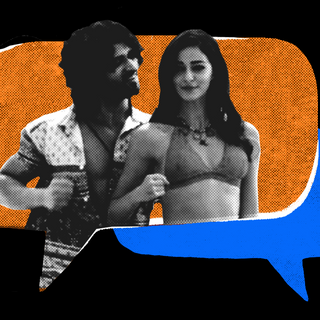Olivia Wilde is the locus of a tidal wave of ire. Her offence? Being Harry Styles’ girlfriend, it would seem. And while she may be the latest, she’s not the only woman to suffer a barrage of hatred, harassment, and negativity for seemingly no reason.
Increasingly, this fixation is directed at women — they are scrutinized, harassed, and policed inordinately, often in connection with another personality that their anti-fans are fans of. Reporter Kaitlyn Tiffany observed just this during the Johnny Depp-Amber Heard trial: ardent, devoted fans of male celebrities become anti-fans of said celebrities’ partners.
Fan studies scholars have begun to pay attention. While fandoms create communities based on mutual love, admiration, and solidarity for a text (which includes celebrities), “anti-fan discourse is increasingly being used as a sort of metaphorical fig leaf for preexisting prejudice and bigotry,” notes one study.
Online communities are increasingly becoming spaces of directing targeted aggression toward celebrities, and name-calling is a characteristic feature driving the aggression. The emotional investment that anti-fans have towards celebrities is akin to that of fans themselves — except that anti-fandoms carry deep negativity in their foundation.
Related on The Swaddle:
Why We Love to Hate‑Watch Things
Anti-fandoms then become a tool to discipline women — especially those who are seen to “have it all” or generally enjoy a degree of success that’s not easily attainable. The worst part? Women themselves may be driving this. A study on influencer anti-fandoms earlier this year, found that women-dominated online communities that hate on influencers purport to do so to call out “fake femininity” — but the project is ultimately undermined by a failure to advance a structural critique of gender. Instead, the anti-fandom spaces becomeyet another vehicle to advance misogyny and cyberbullying.
Sometimes, anti-fandom is leveraged through plain old gate-keeping and sexism. Consider the #NotMyDoctor moment in response to actor Jodie Whittaker taking over as Doctor Who. The backlash against a woman as Doctor Who played on resentments against “woke” media — while straight, white, male anti-fans became the loudest voices in proclaiming their alleged marginalization by the show and BBC.
What makes anti-fandoms such potent mediums for misogyny is their being cloaked in the garb of legitimate critique. Tiffany noted of anti-fans of Amber Heard following a certain playbook common to other anti-fans: they “subject the women they hate to body-shaming and wild criminal accusations, and skewer them using sexist tropes. The targets of their anti-fandom are manipulative and ambitious, as a rule, but also stupid. They are glamorous and seductive, but also secretly disgusting.” But these blatantly misogynistic narratives are justified using progressive stances — many self-proclaimed feminist fans of Johnny Depp said that Amber Heard took feminism back, and thus claimed to be doing a service to feminism by calling her out.
Anti-fandoms then inadvertently represent a reactionary undercurrent in fan cultures — one that valorizes a status quo or a past where bigotry, prejudice, and conservative norms around gender prevailed. As one scholar notes, “… anti-fans are driven by a moral economy concerning notions of authenticity, celebrity, and performance of gender,” further analyzing how anti-fans end up as voices for moral policing.




